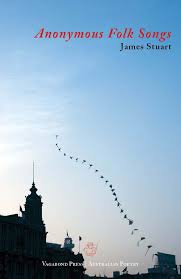 Anonymous Folk Songs is James Stuart’s first full-length poetry collection, released by Vagabond Press in early 2014. His previous creative works and collections have used intermedia methods and proved Stuart’s ability to push boundaries across creative mediums as well as Asia-Pacific cultures. Stuart also crosses such boundaries as technique and theme in Anonymous Folk Songs, moving between rural and suburban Australia and the bustling streets of Vietnam or China.
Anonymous Folk Songs is James Stuart’s first full-length poetry collection, released by Vagabond Press in early 2014. His previous creative works and collections have used intermedia methods and proved Stuart’s ability to push boundaries across creative mediums as well as Asia-Pacific cultures. Stuart also crosses such boundaries as technique and theme in Anonymous Folk Songs, moving between rural and suburban Australia and the bustling streets of Vietnam or China.
Stuart has a clean, clear voice that uses rhythm and conversational tone to carry the reader through deceivingly simple poems only to pull out intense lines and electric endings. He manages to capture common thoughts with commanding poetic expression.
Humble imagery and quiet moments evoke scenes of natural and organic experience, using such subtleties to create clear visions of people and places. Poems such as ‘Populus Nigra var. betulifolia: the black poplar’ balance beauty with destruction in lines such as, ‘you come clutching dry leaves & walk away / with the same crumpled handfuls of gold’ and ‘Every year you relish the steady orbit of spring / & suns that burn like the carcass of bombed-out tanks’.
Stuart changes pace from contemporary Australian urban and rural imagery, and explores the Pacific. He shapes concrete scenes with a dreamlike quality in poems such as ‘Hội An’ and lines like ‘two old Vietnamese men in their finest silks / emerge & pull up stools at a street corner / to play Chinese checkers to the tamarind / flavour of candlelight’.
Out of left field, Stuart plays with structure and theme, touching on postmodernist concerns of technology in the villanelle ‘Time for a deal’, advertisement and health in ‘Degustation’, and sexuality and perception in ‘Frequencies’. Such poems seem somewhat out of place with the authentic voice Stuart uses in earlier poems, but their technique shows flexibility and creativity.
Throughout the vast journeys from rural to city, from the grounded and intimate to the conceptual, Stuart finds his strength in a simpler voice and theme that becomes enriched by his powerful use of imagery and the unexpected intensity of his endings.
Bio: Kyra Bandte is a 22-year old writer and reader from Wollongong, NSW. She graduated from creative writing and English literatures at UOW and now works full-time as a content writer in Sydney. Kyra won the Questions Writing Prize in 2012, has been published in Seizure, Space Place & Culture, and Tide, and writes/edits for online literary magazine Writer’s Edit.
